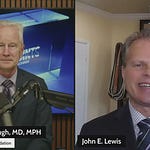By Peter A. McCullough, MD, MPH
Please enjoy this full length issue of Unfiltered I did with Sara Gonzales at Blaze Media in Dallas. Among many of the points made in the conversation was about public health and vaccine preventable disease.
The polio vaccine campaign has been held out as a grand public health achievement. However, in the Salk field trials of the polio vaccine conducted in 1954, a total of 685 cases of paralytic polio (71 in fully vaccinated) occurred among the approximately 1.8 million children monitored across both study designs.
According to the latest estimates from the CDC's Autism and Developmental Disabilities Monitoring (ADDM) Network, about 1 in 31 (or 3.2%) US children aged 8 years have been identified with autism spectrum disorder (ASD). Extrapolating this prevalence rate to the projected US population of 70.9 million children ages 0–17 in 2025 suggests approximately 2.28 million children with ASD. A 2023 CDC analysis of ADDM data found that 26.7% of children with ASD have profound autism, which would indicate roughly 610,000 US children with profound autism. Note that the breakdown for profound autism is based on data through 2016. In our book Vaccines: Mythology, Ideology, and Reality, we peg this number conservatively at 275,000.
Profound autism which is far more disabling than paralytic polio. I have some polio patients in my practice who struggle with braces or a wheelchair, but they have intact cognitive function, are employed, and have wonderful family lives. Profound autistic children however require life long special needs and will never enjoy what polio survivors could realize.
According to a 2025 consensus statement presented at the International Society for Autism Research (INSAR), criteria for profound autism generally include:
Significant cognitive impairment: An Intelligence Quotient (IQ) below 50.
Limited or no verbal language: Individuals may be non-speaking or minimally verbal, with communication primarily limited to expressing basic needs.
Extensive support needs: Requires 24/7, lifelong supervision and assistance with most activities of daily living (e.g., bathing, dressing, preparing meals).
Impaired adaptive skills: Adaptive functioning skills are significantly below age level.
Persistent challenges: These characteristics are not temporary but persist across different environments and situations.
Co-occurring conditions: This group has higher rates of co-occurring conditions like epilepsy and may exhibit challenging behaviors such as self-injury and aggression.
In conclusion, profound autism is a far larger public health problem than 20th century paralytic polio yet schools of public health and our federal agencies have not yet come to this conclusion or raised the alarm bell on profound autism.
Please subscribe to FOCAL POINTS as a paying ($5 monthly) or founder member so we can continue to bring you the truth.
Peter A. McCullough, MD, MPH
President, McCullough Foundation












